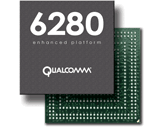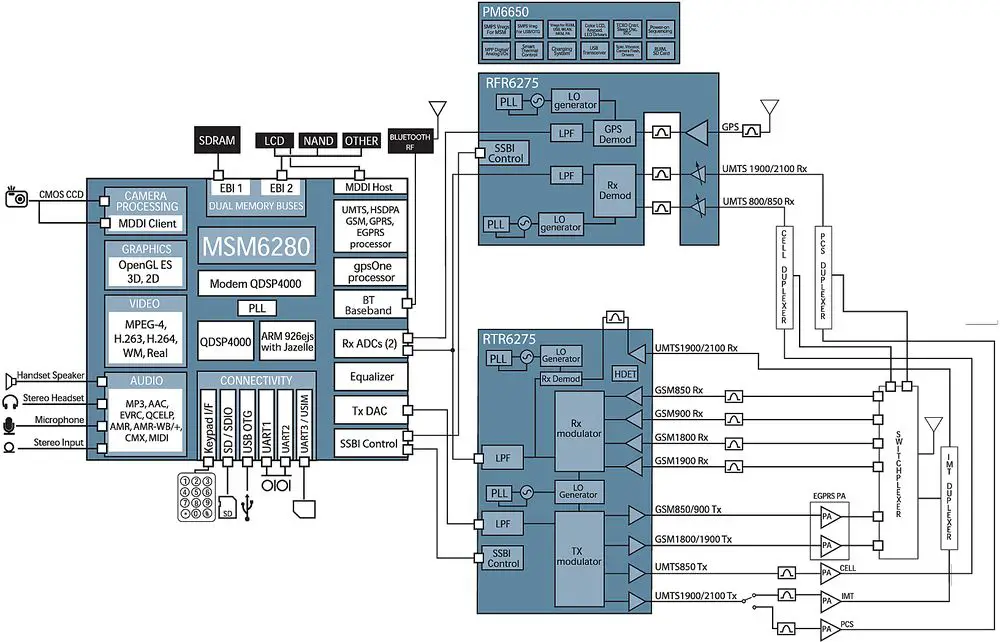From WikiChip
Difference between revisions of "qualcomm/msm6xxx/msm6280"
(added utilizing device) |
|||
| (17 intermediate revisions by 7 users not shown) | |||
| Line 1: | Line 1: | ||
{{qualcomm title|MSM6280}} | {{qualcomm title|MSM6280}} | ||
| − | {{ | + | {{chip |
| name = Qualcomm MSM6280 | | name = Qualcomm MSM6280 | ||
| − | | no image = | + | | no image = |
| − | | image = | + | | image = prodshot e6280.gif |
| image size = | | image size = | ||
| caption = | | caption = | ||
| designer = Qualcomm | | designer = Qualcomm | ||
| + | | designer 2 = ARM Holdings | ||
| manufacturer = TSMC | | manufacturer = TSMC | ||
| manufacturer 2 = IBM | | manufacturer 2 = IBM | ||
| Line 83: | Line 84: | ||
}} | }} | ||
'''MSM6280''' is a {{arch|32}} [[ARM]] [[system-on-chip]] with [[3G]] wireless capabilities developed by [[Qualcomm]] and introduced in [[2005]] for the mobile market. This SoC was part of the {{qualcomm|MSM6xxx}} [[part of::Enhanced Multimedia Platform]] offering support for the most advanced features such as security, position-location, camera & imaging, audio, video, streaming, and conferencing. | '''MSM6280''' is a {{arch|32}} [[ARM]] [[system-on-chip]] with [[3G]] wireless capabilities developed by [[Qualcomm]] and introduced in [[2005]] for the mobile market. This SoC was part of the {{qualcomm|MSM6xxx}} [[part of::Enhanced Multimedia Platform]] offering support for the most advanced features such as security, position-location, camera & imaging, audio, video, streaming, and conferencing. | ||
| + | |||
| + | == Cache == | ||
| + | {{main|arm holdings/microarchitectures/ARM7#Memory_Hierarchy|l1=ARM9 § Cache}} | ||
| + | {{cache info | ||
| + | |l1i cache=16 KiB | ||
| + | |l1i break=1x16 KiB | ||
| + | |l1i desc=4-way set associative | ||
| + | |l1i extra= | ||
| + | |l1d cache=16 KiB | ||
| + | |l1d break=1x16 KiB | ||
| + | |l1d desc=4-way set associative | ||
| + | |l1d extra= | ||
| + | }} | ||
| + | |||
| + | == Wireless == | ||
| + | {{wireless links | ||
| + | | 2g = true | ||
| + | | gsm = true | ||
| + | | gprs = true | ||
| + | | edge = true | ||
| + | | cdmaone = | ||
| + | | is-95a = | ||
| + | | is-95b = | ||
| + | | 3g = true | ||
| + | | cdma2000 = | ||
| + | | cdma2000 1x = | ||
| + | | cdma2000 1xev-do = | ||
| + | | cdma2000 1x adv = | ||
| + | | umts = true | ||
| + | | wcdma = true | ||
| + | | hsdpa = true | ||
| + | | hsdpa rate = 7.2 Mb/s | ||
| + | | hsupa = | ||
| + | }} | ||
| + | |||
| + | == Digital Signal Processing == | ||
| + | * '''DSP:''' 2x [[dsp::QDSP4000]] [[dsp base frequency::72 MHz]] | ||
| + | |||
| + | == Expansions == | ||
| + | * '''LCD:''' 18-bit, QVGA | ||
| + | * '''USB:''' USB 2.0 FS Slave and Host | ||
| + | * '''Camera:''' up to 4 megapixel | ||
| + | * '''Bluetooth:''' BT 1.2 | ||
| + | * Video Codecs: MPEG-4, H.263, H.264, Windows Media and RealNetworks | ||
| + | * Audio Codecs: AMR-NB, AMR-WB/+, AAC, aacPlusTM and Enhanced aacPlus, Windows Media and RealNetworks | ||
| + | * {{qualcomm|gpsOne}} position-location capabilities | ||
| + | * Support for digital stereo output up to 48 kHz | ||
| + | * MIDI Synthesizer (72 polyphony) | ||
| + | * Hardware-based Image Signal Processor and JPEG encoder | ||
| + | |||
| + | == Utilizing devices == | ||
| + | * [[used by::ZTE MF330]] | ||
| + | * [[used by::Sierra Wireless AirCard 860]] | ||
| + | * [[used by::Samsung S7350i]] | ||
| + | * [[used by::Toshiba G450]] | ||
| + | * [[used by::Huawei E226]] | ||
| + | * [[used by::Samsung SGH-U900 Soul]] | ||
| + | |||
| + | {{expand list}} | ||
| + | |||
| + | == Diagram == | ||
| + | [[File:diagram msm6280.jpg|1000px]] | ||
| + | |||
| + | == Documents == | ||
| + | === Datasheets === | ||
| + | * [[:File:diagram msm6280 cs.pdf|MSM6280 Diagram]] | ||
| + | * [[:File:msm6280 chipset.pdf|MSM6280 Chipset]] | ||
| + | [http://bbs.hwrf.com.cn/down52/qualcomm52rf03572.pdf Full Datashee - http://bbs.hwrf.com.cn/down52/qualcomm52rf03572.pdf] | ||
| + | |||
| + | === Other === | ||
| + | * [[:File:platform enhanced.pdf|Enhanced Multimedia Platform Overview]] | ||
Latest revision as of 18:03, 8 February 2023
| Edit Values | |
| Qualcomm MSM6280 | |
 | |
| General Info | |
| Designer | Qualcomm, ARM Holdings |
| Manufacturer | TSMC, IBM |
| Model Number | MSM6280 |
| Market | Mobile, Embedded |
| Introduction | May 13, 2004 (announced) September, 2005 (launched) |
| General Specs | |
| Family | MSM6xxx |
| Series | MSM |
| Locked | Yes |
| Frequency | 270 MHz |
| Bus type | AMBA 2 |
| Microarchitecture | |
| Microarchitecture | ARM9 |
| Chipset | MSM6xxx |
| Core Name | ARM926EJ-S |
| Process | 90 nm |
| Technology | CMOS |
| Cores | 1 |
| Threads | 1 |
| Max Memory | 4 GiB |
| Max Address Mem | 0xFFFFFFFF |
| Multiprocessing | |
| Max SMP | 1-Way (Uniprocessor) |
MSM6280 is a 32-bit ARM system-on-chip with 3G wireless capabilities developed by Qualcomm and introduced in 2005 for the mobile market. This SoC was part of the MSM6xxx Enhanced Multimedia Platform offering support for the most advanced features such as security, position-location, camera & imaging, audio, video, streaming, and conferencing.
Contents
Cache[edit]
- Main article: ARM9 § Cache
| Cache Info [Edit Values] | ||
| L1I$ | 16 KiB 16,384 B 0.0156 MiB |
1x16 KiB 4-way set associative |
| L1D$ | 16 KiB 16,384 B 0.0156 MiB |
1x16 KiB 4-way set associative |
Wireless[edit]
| Cellular | ||||||||||
| 2G |
| |||||||||
|---|---|---|---|---|---|---|---|---|---|---|
| 3G |
| |||||||||
Digital Signal Processing[edit]
- DSP: 2x QDSP4000 72 MHz0.072 GHz
72,000 kHz
Expansions[edit]
- LCD: 18-bit, QVGA
- USB: USB 2.0 FS Slave and Host
- Camera: up to 4 megapixel
- Bluetooth: BT 1.2
- Video Codecs: MPEG-4, H.263, H.264, Windows Media and RealNetworks
- Audio Codecs: AMR-NB, AMR-WB/+, AAC, aacPlusTM and Enhanced aacPlus, Windows Media and RealNetworks
- gpsOne position-location capabilities
- Support for digital stereo output up to 48 kHz
- MIDI Synthesizer (72 polyphony)
- Hardware-based Image Signal Processor and JPEG encoder
Utilizing devices[edit]
- ZTE MF330
- Sierra Wireless AirCard 860
- Samsung S7350i
- Toshiba G450
- Huawei E226
- Samsung SGH-U900 Soul
This list is incomplete; you can help by expanding it.
Diagram[edit]
Documents[edit]
Datasheets[edit]
Full Datashee - http://bbs.hwrf.com.cn/down52/qualcomm52rf03572.pdf
Other[edit]
Facts about "MSM6280 - Qualcomm"
| base frequency | 270 MHz (0.27 GHz, 270,000 kHz) + |
| bus type | AMBA 2 + |
| chipset | MSM6xxx + |
| core count | 1 + |
| core name | ARM926EJ-S + |
| designer | Qualcomm + and ARM Holdings + |
| dsp | QDSP4000 + |
| dsp base frequency | 72 MHz (0.072 GHz, 72,000 kHz) + |
| family | MSM6xxx + |
| first announced | May 13, 2004 + |
| first launched | September 2005 + |
| full page name | qualcomm/msm6xxx/msm6280 + |
| has 2g support | true + |
| has 3g support | true + |
| has edge support | true + |
| has gprs support | true + |
| has gsm support | true + |
| has hsdpa support | true + |
| has locked clock multiplier | true + |
| has umts support | true + |
| has wcdma support | true + |
| instance of | microprocessor + |
| l1d$ description | 4-way set associative + |
| l1d$ size | 16 KiB (16,384 B, 0.0156 MiB) + |
| l1i$ description | 4-way set associative + |
| l1i$ size | 16 KiB (16,384 B, 0.0156 MiB) + |
| ldate | September 2005 + |
| main image |  + + |
| manufacturer | TSMC + and IBM + |
| market segment | Mobile + and Embedded + |
| max cpu count | 1 + |
| max memory | 4,096 MiB (4,194,304 KiB, 4,294,967,296 B, 4 GiB, 0.00391 TiB) + |
| max memory address | 0xFFFFFFFF + |
| microarchitecture | ARM9 + |
| model number | MSM6280 + |
| name | Qualcomm MSM6280 + |
| part of | Enhanced Multimedia Platform + |
| process | 90 nm (0.09 μm, 9.0e-5 mm) + |
| series | MSM + |
| smp max ways | 1 + |
| technology | CMOS + |
| thread count | 1 + |
| used by | ZTE MF330 +, Sierra Wireless AirCard 860 +, Samsung S7350i +, Toshiba G450 +, Huawei E226 + and Samsung SGH-U900 Soul + |
